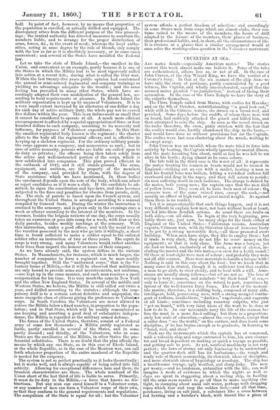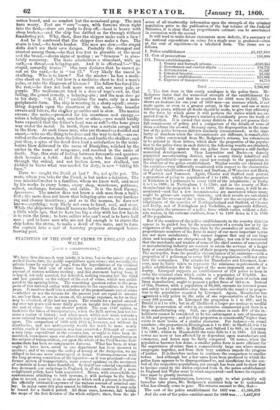CRUELTIES AT SEA.
ARE mates fiends—especially American mates The stories current this week almost make one believe it. Some of the tales are authenticated, others less so, or not at all. In the case of John Craven, of the ship Wizard Xing, we have the verdict of a Coroner's Jury. In that of the six seamen of the ship Anne we have only the story of partisans, partly contradicted by a good witness, the Captain, and wholly uncorroborated, except that the accused mates pleaded "no jurisdiction," instead of facing their accusation. In the case of the Flora Temple we have the story of the culprits themselves.
The Flora Temple sailed from Macao, with coolies for Havaila; and on the 8th of October, notwithstanding "a good look out," while still in the Chinese waters, she struck on a broad reef, and perished. Some days before the coo14s, of whom there were 850 on board, had suddenly attacked the guard and killed him, and then attempted to seize the ship. As soon as the vessel struck on the rocks therefore, the crew, panic stricken with the fear that the coolies would rise, hastily abandoned the ship in the boats,— and would have done so without provisions but for the Captain. The coolies were last seen clustering about the wreck, waiting to be swept away.
John Craven was an invalid, whom the mate tried to force into activity by beating, the Captain wholly ignoring his mortal illness, and the mate knocking him about, until at last he was left to rot alive in his berth; dying almost as he came ashore.
The tale told in the third case is the worst of all : it represents the mates treating the seamen as beasts would not be treated in England—striking out an eye with a mallet, beating a man so that his frontal bone was broken, letting a wretched sufferer fall overboard and drag in the ropes, and then fall astern to perish; six men suffering death in such fashions. The charge is denied by the mates, both young men ; the captain says that the men died. of yellow fever. They seem all to have been men of colour ; th accusers were of the same mixed race, except the cook,—not usually an officer of high rank or great moral weight. As against them there is no verdict.
Yet it is unquestionable that such things happen, and it is not very difficult to explain how men, not born without head or heart, are led into these fiendish actions. As usual there are faults on both sides,—on all sides. To begin at the very beginning, pro- bably there are, just now, too many ships for the trade either of England or the United States : Californian visions, Australian exports, Crimean war, with its Oliverian ideas of immense booty to be got by a strong mercantile fleet,—all these promoted over- building. When men have ships, they like to employ them ;- but if trade is very slack, they do not like to waste money on the equipment ; so that is very close. The Anne was a barque, yet she had on board, exclusively of the cook, a crew of eleven, in- cluding the master and the two mates,—a crew for a Leith smack ! Of these at least eight were men of colour ; and probably they were not all able seamen. Here were materials to handle a barque with ! Nothing is said in this case about the food ; but we know that in many cases it is stinted, though it is sufficient food that enables a man to go aloft, to steer steady, and to haul with a will. Ame- ricans are usually sharp fellows,—but all are not so. The love of roving is very common, and numbers "try their hand" at sea,— only to leave it ; sometimes on the return to port, sometimes by favour of the well-known Davy Jones. The crew of the mercan- tile marine, therefore, is a shifting body, composed of many able, intelligent, bold, persevering men, with a strong mongrel contin- gent of ruffians, landlubbers, " darkies," vagabonds, and vagrants of all kinds ; sometimes including runaway culprits, who just "get on board," with very faint ideas of the work to be done or how to do it. In our mercantile navy the life of the seaman be- fore the mast is a more fixed calling ; but there is a proportion- ately low scale of education,—almost the very lowest, except that a sailor does "see the world," on the surface, and does learn some discipline, if he has brains enough so to graduate, in learning to "hand, reef, and steer."
Such are the instruments which the captain has at command, with a valuable ship and cargo entrusted to him, his own charac- ter and bread dependent on making as quick a voyage as possible, and getting safe to port. As yet, nautical machinery is not very perfect ; the laws of storms are only beginning to be understood ; and the quarter-deck still has its barbarisms,—its rough and ready rule of thumb seamanship, its clownish ideas of discipline, and more clownish ideas of hygeiology or nosology. The ship has a troublesome voyage, ugly weather, and sharp risks. The men get weary,—and no landsman, unfamiliar with the life, can well imagine a mode of existence in which the nights as well as days are spent in staggering about a reeling ship, in hauling till the arms seem readier to go off than to make anything else tight, in stamping about amid salt water, perhaps with dragging ropes which tear and rasp the sodden feet,—and all that time,
perchance, living on salt junk, a substance like a cross between red herring and a butcher's block, with biscuit like a piece of
rotten board, and no comfort but the occasional grog. The men turn weary. Feet are "sore"—aye, with furrows riven right into the liesh,—a:rms are ready to drop off,—head is heavy with sleep broken,—and the ship has drifted so far through without foundering yet. Why, then, does the skipper make such a fuss ?
And be it confessed that the skipper does make a fuss. The storm is loud,—he bawls louder. The men are slow,—the stupid dolts don't see their own danger. Probably the strongest and stoutest among them,—he that was first to grumble at the meat and the bread,—shows signs of mutiny ; so "firmness" is abso- lutely necessary. The mate administers a stimulant, with an oath,—a threat,—a belaying-pin. And it is effectual !—" The stupid, cowardly brutes ! ' One man declares that he cannot go out on the yard,—he is "too ill." Very likely the rascal is skulking. Who is to know ? Not the master : he has a medi- cine chest on board ; but how is a medicine chest to feel a man's pulse, or take the diagnosis of his case ? The fellow has fared like the rest,—he does not look more worn out, nor more pale, or purple. The medicament tried is a dose of rope's end, or, that failing, the grand remedy, a belaying-pin ; and the man does go to his duty. "Q. E. D. ! " exclaims the mate, only in a more periphrastic form. The ship is wearing in a sharp squall ; every- thing depends upon the smartness of the men,—the brawler swears and loiters, the skilker grumbles and is slow. The master swears ; the mate,—promoted for his smartness and energy,— seizes a belaying-pin, and, somehow or other,—you would hardly have expected that the fellow's head was so soft !—the bone gives way under the metal. In truth, there was a certain savage will in the blow. At such times men, who are themselves decided and smart,—who see the thing to be done and the way to do it,—are re- volted at the slowness, hate the loiterer, and loathe the skulker ; and just then, a spice of the fiend does lend a satisfaction to the retri- butive blow delivered in the name of Discipline, relished by the smiter in the name of vengeance and received in the name of death. Nay, this state of feeling vengeance, forecastle and quarter- deck becomes a habit. And the mate, who has himself gone through the ordeal, and not broken down, nor skulked, nor yielded to blows what was needed for duty, is now "taking his turn."
Ilave we caught the Devil at last ? No, not quite yet. The mate, whom you take for the Fiend, is but under a delusion. The true mischief-maker is a familiar, whom we know well, and meet by his works in every home, every shop, warehouse, pothouse, .street, exchange, forecastle, and cabin. It is the Arch Enemy, Ignorance. The master dces not know a sick man from a bull's foot ; the mate does not know that belaying-pins are very harden- ing and clumsy incentives ; and as to the seaman, he does not know—anything; very likely not even to hand, reef, and steer. While the shipowner himself knows no better than the farmer did a little while ago, that to have too big a ship with too few hands " is to ruin the farm ; to have sailors who can't read is to have half men ; and to have men who are not fed enough is to starve the ship before the storm, to make a devil of the mate, and to force the captain into a sort of barratry prepense arranged before leaving port.



























 Previous page
Previous page